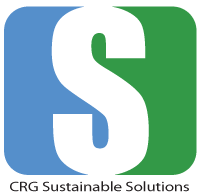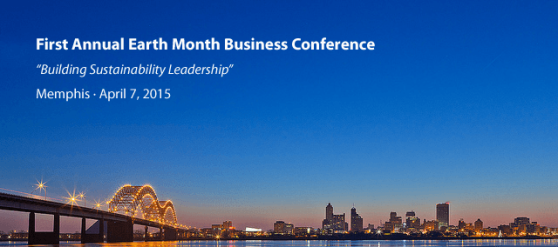First Annual Earth Month Conference for AK-MI-TN Region to be hosted April 7th in Memphis
Memphis, TN, March 30, 2015 – The First Annual Earth Month Business Conference (EMBC) of Arkansas, Mississippi and Tennessee will be hosted April 7th in Memphis, Tennessee. The EMBC is jointly presented by CRG Sustainable Solutions (CRGss), the International Society of Sustainability Professionals (ISSP), and The Sustainability Consortium (TSC), along with corporate title sponsor FedEx.
Says Mary Singer, the CEO of CRGss and the conference’s initiator, “This is not just another conference, not just another ‘environmentalist’ effort. It’s all about sustainability—the idea that good environmental sense is good business sense, and, ultimately, means more profit for business, more benefit for consumers and our culture at large.”
Uniquely, Singer explains, the EMBC will bring together leaders and technical specialists from big business in the AK, MI and TN region —FedEx, International Paper, Buckman International, Brother International and others —with representatives of small to medium sized businesses, municipal governments, and non-profits. “Forging fresh relationships and collective impact is our primary objective”, she says. “The conference will feature not only speakers, but panel discussions and exercises designed to bring broad cross sector people together who don’t usually communicate. How can we help you? How can you help us? We need to reach across traditional boundaries to learn, so that we can preserve resources and grow the bottom-line. . That’s our theme, and it’s all about improving both business and life.”
The conference will address sustainability as smart business and moving away from “business as usual,” including: conducting business in an efficient manner, using intelligent design, minimizing waste and “end of the useful life” disposal.
“The Sustainability Consortium (TSC) is proud to join ISSP and CRGss in presenting this inaugural conference and to help drive the mission of more sustainable business,” stated Dr. Sarah Lewis, Managing Director, Research and Integration of TSC. “The foundation of TSC is global collaboration across sectors and industries, including large and small organizations, and this conference echoes the same commitment in the AK, MI and TN region.”
The conference will feature more than a dozen corporate and institutional sponsors, including title sponsor FedEx. Among the others: The University of Memphis, The University of Arkansas, Christian Brothers University, RockTenn, The Memphis and Shelby County Office of Sustainability, Leadership Memphis, Viridian, the Tennessee, Mississippi and Arkansas Recycling Coalitions, and more.
Shelby County Mayor Mark Luttrell will open the conference. Speakers and panelists will cover a wide range of topics including:
- “Sustainable Packaging: Unpacking Hidden Value in Your Busines”
- “Waste & Recycling: From Burden to Benefit”
- “Green your Supply Chain—Green Your Bottom Line”
- “Sustainability Reporting—Challenges, Trends and Opportunities”
- “Leading Green Cities—Where to Begin”
- “Exploring Benefits of Sustainable Built Environment”
“It’s a cradle-to-grave thing,” Singer says. “For a healthy earth and healthy profits, we need to bring together people representing every point along the way from sourcing resources through end-of-life disposal of everything we produce. We’re going to be issuing some tough challenges at this conference, and offering some creative opportunities to interact in new ways and think new things.”
The capstone of the EMBC will be the inaugural meeting of the Tennessee-Arkansas-Mississippi chapter of the ISSP. Since 2007 the ISSP has been the premier organization serving sustainability professionals worldwide. Says ISSP director Maureen Hart, “I’m delighted to see Tennessee, Arkansas and Mississippi forming a regional ISSP chapter. These three states stand at the center of so much we’re concerned about, and at the center of so many opportunities to affect positive change.” Representatives of businesses, governments, non-profits, individual professionals, and all interested persons are invited to this inaugural meeting of the regional ISSP chapter.
The conference and the inaugural ISSP chapter meeting will be held April 7th at the Holiday Inn, 3700 Central Avenue, Memphis, Tennessee 38152.
AGENDA: http://sustainability-leadership conference.snack.ws/schedule.html
OVERVIEW: http://sustainability-leadership-conference.snack.ws/
REGISTER: http://conta.cc/1Acf5Nm
ISSP: www.sustainabilityprofessionals.org
About ISSP
The International Society of Sustainability Professionals (ISSP) is the world’s leading professional association for sustainability professionals. ISSP is a member-driven association committed to moving the profession of sustainability forward through building strong networks and communities of practice. Webinars, online courses, a sustainability certificate, sustainability professional’s body of knowledge, special reports, resource directories, and salary surveys are just a sampling of the rich content offered to members. Formed in 2007, ISSP boasts almost 1000 members from every region of the world. Members share resources and best practices, and develop themselves professionally. For more information about ISSP and its offerings, please visit www.sustainabilityprofessionals.org.
About The Sustainability Consortium
The Sustainability Consortium® (TSC®) is a global nonprofit organization working at the intersection of science and business to enable the consumer goods industry to develop, produce and sell more sustainable products. TSC creates tools, strategies and services that are based in science, informed by stakeholders and focused on impact across the entire lifecycle of consumer products, including environmental, social and economic imperatives. The Sustainability Consortium is comprised of more than 100 members, including manufacturers, retailers, NGOs, civil society and corporations that work collaboratively on innovation for a new generation of products and supply networks. The Sustainability Consortium is jointly administered by Arizona State University and the University of Arkansas, with additional operations at Wageningen UR in the Netherlands and Nanjing University in China.. www.sustainabilityconsortium.org
About CRG Sustainable Solutions
It is the mission of CRG Sustainable Solutions (CRGss) to help organizations create innovative and long-term sustainable business practices. It is based in Memphis, Tennessee with clients across the United States. CRGss is dedicated to helping organizations create innovative and long-term sustainable business practices that will help them better achieve a triple bottom line – people, planet and profit. CRGss provides a variety of consulting services which includes risk management, risk assessment, sustainability audits, materiality mapping assessments, sustainable supply chain consulting and others. www.crgss.com
Contact Information
Mary Singer
CEO
CRG Sustainable Solutions
Email: msinger@crgss.com
Tel: (901) 277-4500





 To stay on top of your weed situation, consider the following:
To stay on top of your weed situation, consider the following: